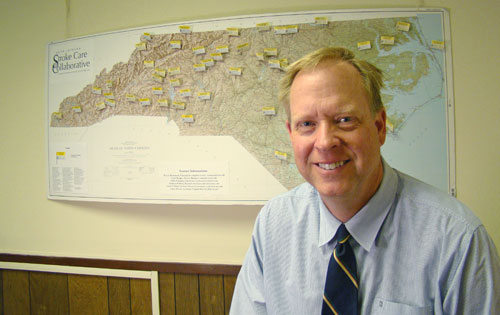New grant partners Gillings School with Wake Forest Baptist Medical Center and 51 NC hospitals
February 24, 2015
Residents of North Carolina are 20 to 40 percent more likely to die of stroke than those living in other parts of the country. While stroke awareness campaigns educate the public about symptoms and the importance of getting to a hospital quickly, patients and health-care providers believe that what happens after stroke patients leave the hospital is just as important as how quickly they arrive. A new grant will help discover whether this is true.
A $10 million, five-year grant from Patient-Centered Outcomes Research Institute (PCORI) − a nonprofit, nongovernmental organization established through the Affordable Care Act and authorized by Congress – will study stroke patients across North Carolina to ascertain whether longer-term, post-stroke care improves daily function. A secondary goal is to measure and reduce the degree of caregiver stress.
This first statewide study of its kind and scope is being co-led by Wayne Rosamond, PhD, professor of epidemiology at The University of North Carolina’s Gillings School of Global Public Health. Other lead researchers include principal investigator Pamela W. Duncan, PT, PhD, professor of neurology and senior policy adviser for innovations and transitional outcomes at Wake Forest Baptist Medical Center, and co-principal investigator Cheryl D. Bushnell, MD, MHS, director of the Wake Forest Baptist Stroke Center.
Partnering in the statewide endeavor are 51 hospitals that are part of the North Carolina Stroke Care Collaborative registry. Also collaborating are faculty members from the East Carolina University School of Medicine’s Center for Health Disparities and the Duke University School of Nursing.
The five-year study, called COMPASS (Comprehensive Post-Acute Stroke Services), will compare patients who receive existing stroke treatment as they are discharged home with patients who receive comprehensive stroke services once they return home.
COMPASS was one of only five proposals funded from among the 231 letters of intent received by PCORI.
“The COMPASS Study builds on a successful history of partnership with hospitals in the N.C. Stroke Care Collaborative Project to create innovative approaches to improving acute stroke care,” Rosamond said. “This is an extraordinary opportunity to extend that and make real advances in the care of stroke patients when they return home.”
COMPASS deploys nurse practitioners or physician assistants to coordinate discharge services and help in the transition from hospital to home. Within seven to 14 days of discharge, these providers see the stroke patient at the patient’s home or in a clinic. With the patient’s caregiver, the provider develops an individualized care plan for each patient. A trained community coordinator works with local organizations to ensure that recovering patients and caregivers are provided with the services and support they need. There is regular contact with the patient and caregiver for at least 90 days after discharge.
The comprehensive components of COMPASS were determined based upon feedback from stroke survivors who shared their experiences and ideas for improved post-discharge stroke care with the study investigators.
In this two-phase study, adult patients admitted to a N.C. Stroke Care Collaborative hospital, diagnosed with stroke and discharged directly from acute care at the hospital to the home will be eligible to enroll.
In Phase I, COMPASS and usual care will be compared. Half of the participating hospitals will be randomly assigned to provide COMPASS to all stroke patients at discharge, while the remaining half will provide usual care.
In Phase II, the usual-care hospitals will provide COMPASS, while the Phase 1 hospitals will continue to provide comprehensive post-care services. At least 9,000 patients are expected to be reached through this study, which is slated to begin in 2016.
The statewide venture is made possible largely through the efforts of two state institutions. Since 1995, the N.C. Department of Health & Human Services’ Justus-Warren Heart Disease and Stroke Prevention Task Force has provided statewide leadership in preventing heart and vascular disease and has kept the issue of improving the health of North Carolinians in front of state lawmakers.
In 2002, Rosamond began to develop a network of hospitals that would become the North Carolina Stroke Care Collaborative registry, the hospitals in which the COMPASS intervention will be tested. For the past 12 years, these registry hospitals have been involved in quality improvement efforts in acute care of stroke patients.

